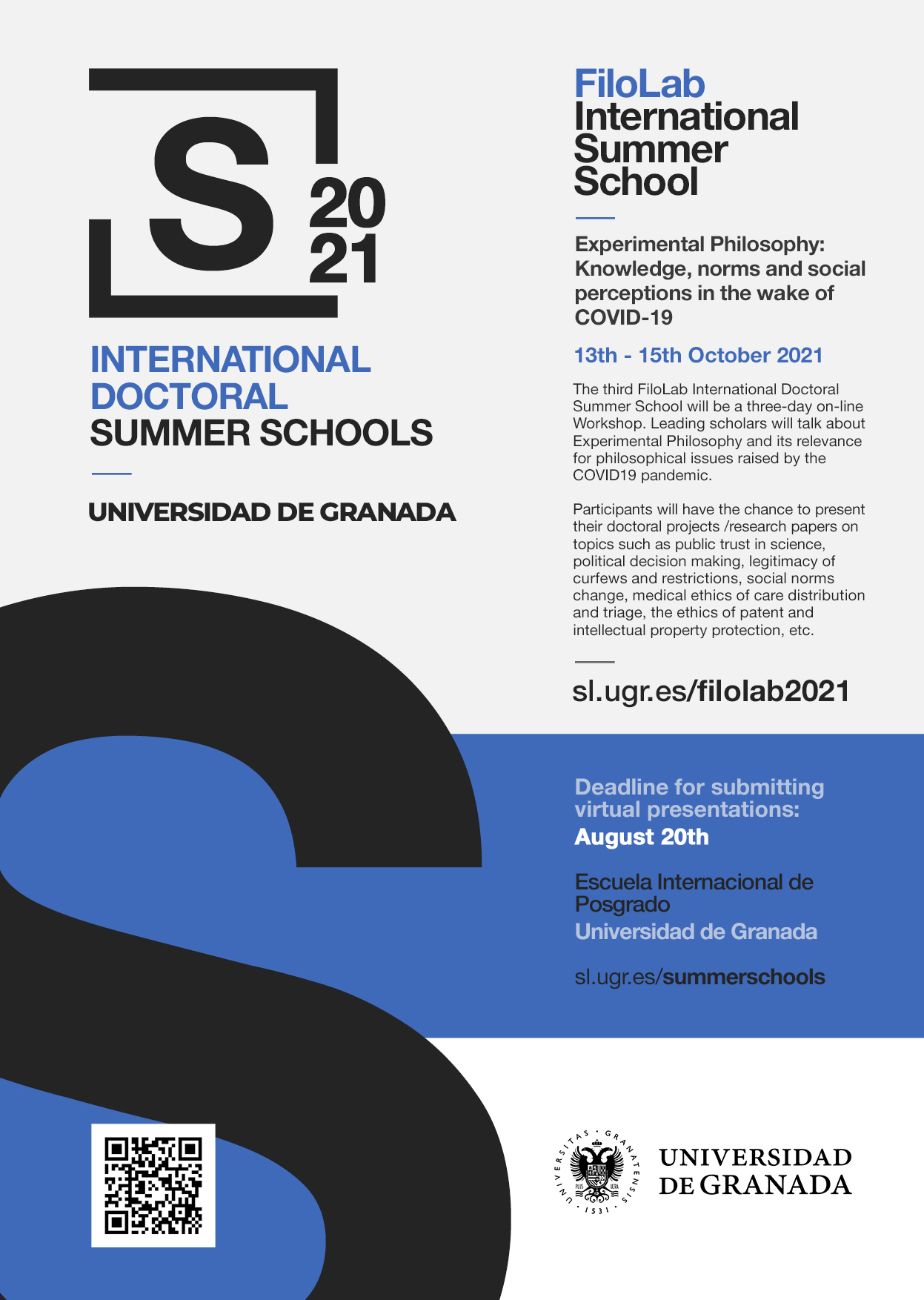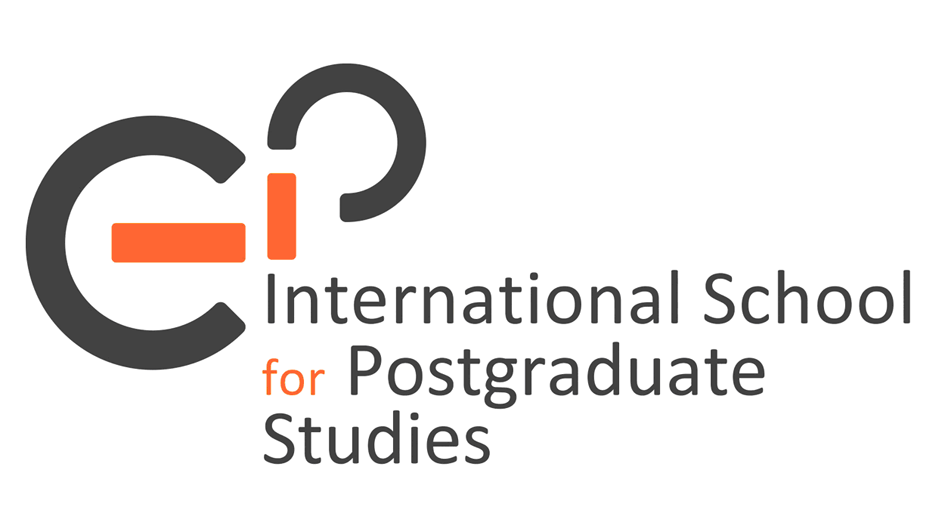
Experimental Philosophy:
Knowledge, norms and social perceptions in the wake of COVID-19.
October 13 - 15, 2021.
On-Line Workshop
The Third Filo-Lab International Doctoral Summer School will be held on-line due to the uncertainty created by the COVID-19 pandemic. We hope the online format will allow both professors and students to plan in advance.
The organizers as well as the guest professors are committed to keep as much as possible the spirit of previous editions of FiloLab ISS, based on both academic sessions and a number of social activities and occasions for exchange and networking. The academic side was based on keynote-talks by distinguished professors as well as presentations and discussions of Ph. D. Candidates’ projects and papers. While the social side of the School will be missing to a large extent, the format of the academic on-line sessions will be kept; our guest speakers are world-class philosophers who have made outstanding contributions; and we expect to promote as open and relaxed discussion as possible, so that the full benefits of the workshop accrue to all participants.
Topic
The organizing committee has decided to focus on a number of issues raised by the COVID-19 pandemic, since this is certainly generating most interest at this moment in our field and in other areas of the humanities and social sciences. Also, we have decided to narrow the methodological approach to experimental philosophy, a methodology that is the hallmark of several research groups and projects in the the Doctoral Program of the University of Granada and Filo-Lab Research Unit, and has been used to shed light on a diversity of classic philosophical problems that have become relevant in our current circumstance: questions such as public trust in science (epistemology) and in mechanisms of political decision; social preparedness in the face of uncertain or unexpected shocks; social priorities in health, economy, culture, etc.; evolution and change of social norms and social priorities; threats to individual liberty and liberal rights due to widespread governmental curfews and restrictions; aspects related to crucial issues in medical ethics and bioethics, such as distribution of scarce medical resources (medical triage, vaccination protocols, etc.), the status and role of the public health system, impact of the pandemic on key indicators of well-being (death rates, life expectancy, early detection of other illnesses and conditions), etc.
This wide array of topics generate deep philosophical questions that—directly or indirectly—are been dealt with by numerous doctoral research projects. The Workshop will consider both theoretical and applied/empirical questions and proposals for discussion.
The workshop admits of two ways of participation:
-
Attendance: general audience of Ph.D. candidates who wish to attend to the three-session workshop
-
Presentation: presenters who wish to submit their Ph.D. research project for eventual discussion with specialist professors in the course of the workshop. Prospective presenters must submit an extended abstract of their research (between 500 and 1000 words). These abstracts will be considered by the organizing committee of the Doctoral Workshop and on the basis of thematic fit and quality, may be given the chance of being presented and discussed as part of the Workshop sessions. These presentations will be assigned to a particular session according to their topic and presentations slots in the final program.
Methodology
The workshop is conceived as a theoretical/practical encounter where Ph.D. candidates are given the chance to present and discuss their projects with the guest professors as well as with specialized members of our own program and colleagues. However, it is expected that a general audience of graduate students with general interests on the topics covered by the Workshop will be able to benefit from expert introductions to the method and possibilities of experimental philosophy, as well as to recent results that show how experimental philosophy can contribute to current social issues -in this case, to the above-mentioned questions related to the pandemic-.
The Workshop will have three independent sessions, scheduled so that participants from several time-zones can connect on-line. Each session will feature one of our guest professors. Prof. Earp will introduce the method of experimental philosophy and its possibilities; Prof. Bicchieri will focus on experimental ethics and social norms; prof. Deroy will focus on epistemological issues.
Sessions will be organized on-line through the SALVE system of the University of Granada (Zoom). Registered participants will receive information and passwords in advance.
Organizing Committee
Lilian Bermejo Luque, Pedro Francés Gómez, Ester Massó Guijarro, David Rodríguez-Arias, Ivar Rodríguez Hannikainen, Jon Rueda Etxebarría, Neftalí Villanueva González y Mario Espinoza Pino.
Invited Scholars

Cristina Bicchieri, S. J. Patterson Harvie Professor of Social Thought and Comparative Ethics; Director of the Philosophy, Politics, and Economics Program. Director of the Center for Social Norms and Behavioral Dynamics; University of Pennsylvania.

Ophelia Deroy, Chair and Head of Philosophy of Mind/CVBE, Graduate School in Systemic Neuroscience (GSN); Ludwig Maximilian University Munich.

Brian Earp, Department of Philosophy, Yale University. Senior Research Fellow Uehiro Center for Ethics (University of Oxford)
Expected attendance
Due to the on-line nature of the Workshop, there are no restrictions in the number of attendees that can be accepted. The organizing committee has set the number of expected attendees at 20, based on previous experience.
However, the number of possible presenters will be set at a maximum of twelve (12) persons.
Who can attend: the workshop has an open and interdisciplinary scope. The main topic as well as the above-mentioned themes and issues are of interest for social scientists in general, as well as many health-care scientists and practitioners. Previous experience shows that discussion is greatly enriched when the Summer School includes graduate students from several backgrounds. Therefore, Ph.D. candidates not only in Philosophy/Ethics, but also in neighboring areas such as Neuro-science/Psychology, Sociology/Political Science, other branches of the Humanities, Law, Economy, etc. are welcome.
The workshop is expected to generate a network of contacts for future collaboration and academic exchange.

Registration and fees
There will be a single registration fee of twenty-five Euros (25€) that covers administrative paperwork, access to the virtual room, course materials, and certificate of participation/presentation.
Registration fee may be waived for non-funded / unemployed students upon request. In this case, students must prove they are enrolled in a Ph.D. program as well as the condition they allege.
There will be up to 5 free-of-charge places reserved for Ph. D. Students from any of the Universities belonging to the ARQUS Alliance, provided they fulfill the general admision criteria.
Submission Procedure and Registration
Please submit your proposal to filolab@ugr.es. The deadline for the submission of proposals is August 20th, 2021. Accepted proposals will be confirmed shortly after reception, until reaching the limit of available places. Each proposal should include:
- Name
- Affiliation (if any)
- Title of research proposal
- Abstract (between 500 and 1000 words)
- Scientific areas of interest (100 words max.)
In case you want to register without submitting a proposal, just send us your name, e-mail and institutional affiliation.
Registration
Transfer to Bank Account Number: ES 67 2038 3505 3764 0000 1291
SWIFT: CAHMESMMXXX
IMPORTANT: Please, indicate "FILOLAB" + NAME + SURNAME. Also, in any section you must include the ID or passport number of the person registered.
Send proof of payment via e-mail to filolab@ugr.es
Contact
For further information, please write to filolab@ugr.es
Where are we
Facultad de Filosofía (Edificio de Psicología), Campus Cartuja s/n, 18011 Granada, España

